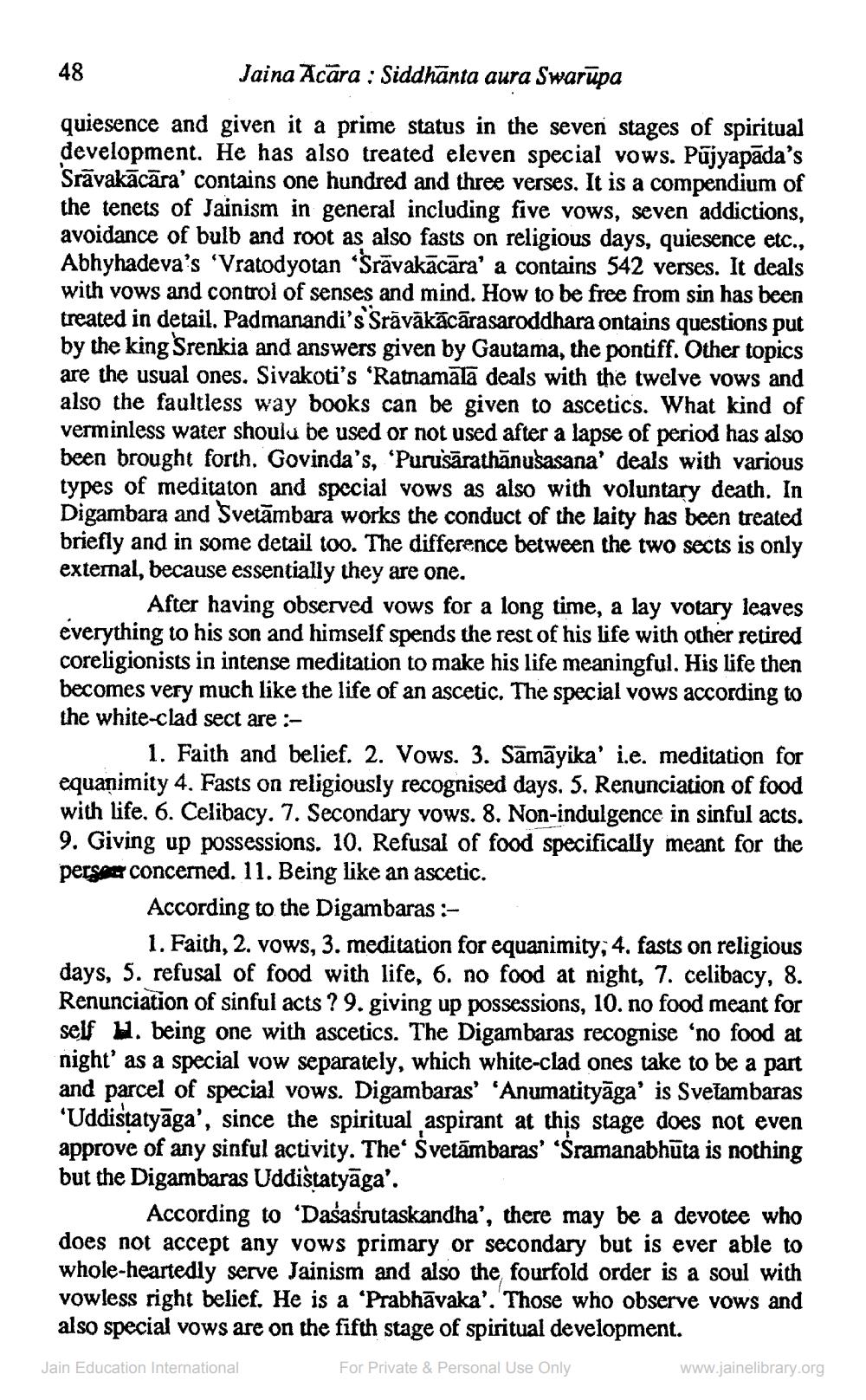________________
Jaina Acāra : Siddhānta aura Swarūpa
quiesence and given it a prime status in the seven stages of spiritual development. He has also treated eleven special vows. Pūjyapāda's Srāvakācāra' contains one hundred and three verses. It is a compendium of the tenets of Jainism in general including five vows, seven addictions, avoidance of bulb and root as also fasts on religious days, quiesence etc., Abhyhadeva's 'Vratodyotan 'Srāvakācāra' a contains 542 verses. It deals with vows and control of senses and mind. How to be free from sin has been treated in detail. Padmanandi's Srāvākācārasaroddhara ontains questions put by the king Srenkia and answers given by Gautama, the pontiff. Other topics are the usual ones. Sivakoti's 'Ratnamāla deals with the twelve vows and also the faultless way books can be given to ascetics. What kind of verminless water shoulu be used or not used after a lapse of period has also been brought forth, Govinda's, 'Purusārathānusasana' deals with various types of meditaton and special vows as also with voluntary death. In Digambara and Svetāmbara works the conduct of the laity has been treated briefly and in some detail 100. The difference between the two sects is only external, because essentially they are one.
After having observed vows for a long time, a lay votary leaves everything to his son and himself spends the rest of his life with other retired coreligionists in intense meditation to make his life meaningful. His life then becomes very much like the life of an ascetic. The special vows according to the white-clad sect are :
1. Faith and belief. 2. Vows. 3. Sāmāyika' i.e. meditation for equanimity 4. Fasts on religiously recognised days. 5. Renunciation of food with life. 6. Celibacy. 7. Secondary vows. 8. Non-indulgence in sinful acts. 9. Giving up possessions. 10. Refusal of food specifically meant for the persone concerned. 11. Being like an ascetic.
According to the Digambaras :
1. Faith, 2. vows, 3. meditation for equanimity; 4. fasts on religious days, 5. refusal of food with life, 6. no food at night, 7. celibacy, 8. Renunciation of sinful acts ? 9. giving up possessions, 10. no food meant for self u. being one with ascetics. The Digambaras recognise ‘no food at night as a special vow separately, which white-clad ones take to be a part and parcel of special vows. Digambaras' 'Anumatityāga' is Svetambaras 'Uddistatyāga', since the spiritual aspirant at this stage does not even approve of any sinful activity. The Svetāmbaras' 'Sramanabhūta is nothing but the Digambaras Uddistatyāga'.
According to 'Dašasrutaskandha', there may be a devotee who does not accept any vows primary or secondary but is ever able to whole-heartedly serve Jainism and also the fourfold order is a soul with vowless right belief. He is a 'Prabhāvaka'. Those who observe vows and also special vows are on the fifth stage of spiritual development.
Jain Education International
For Private & Personal Use Only
www.jainelibrary.org




